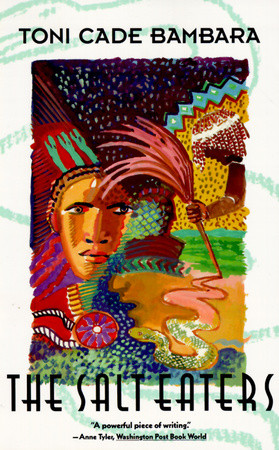Editor’s Note: The American Booksellers Association’s Revisit & Rediscover program showcases favorite titles selected by independent booksellers. Today, Kris Kleindienst, co-owner of Left Bank Books in St. Louis, Missouri, writes about Toni Cade Bambara’s novel, The Salt Eaters.
Toni Cade Bambara’s novel, The Salt Eaters, takes place in the late 1970s in a fictional southern town somewhat biblically named Claybourne. Velma Henry—activist, leader, musician, spiritual seeker, wife, mother, black woman, and now survivor of attempted suicide—is seated in her town’s Afrocentric medical center amidst a circle of people. Some are med student observers and some are participants, but all are watching as folk healer Minnie Ransom holds court, attempting to work her magic with Velma.
Outside the clinic, Velma’s comrades in art, politics, and life make their various preparations for the Mardi Gras–like festival that will occur that evening. Velma’s friends and family are artists, musicians, and writers as well as activists. They struggle to come to terms with what we now call intersectionalities: they want to create a better life for black people with an arts center and a health clinic and better housing, but they sit in the shadow of a chemical factory and nuclear power plant that, while providing much-needed jobs, they fear are slowly poisoning them.
As the town prepares to celebrate, The Salt Eaters alternates between Velma—as she is guided, urged, pushed, and cajoled by the healer Minnie to face the demons of her past—and the reflections and misgivings of the people who work with and love her.
Dazzling, richly nuanced prose carries the cadence of the drumbeats of the musicians who seem always to be somewhere nearby. It is almost as if everyone, everywhere—from the clinic to the streets to the cafes—are part of an enormous, slowly coalescing creation ritual. And the ever-present music—from African drumbeats to Charlie Parker—carry us along. To be sure, a storm—at once emotional, metaphorical and actual—is building.
I loved this book. Though I am not black, I came of age in the time this novel is set and also worked on social justice issues while trying to reinvent, with my sisters in struggle, better ways of living. The novel rings true. But even more so, The Salt Eaters, while giving us a beautifully imagined snapshot of a time and place, also has great resonance for the Black Lives Matter movement today. Whether you are involved in this twenty-first century movement or merely a bystander to history, you will find that The Salt Eaters is as timeless as it is current.
Kris Kleindienst is co-owner of Left Bank Books in St. Louis, Missouri, where she has worked since 1974.





